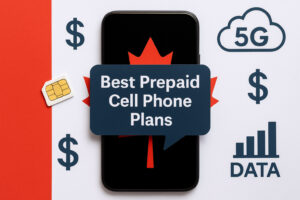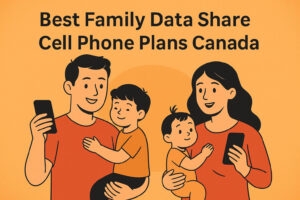Let’s be honest: choosing a cell phone plan in Canada can feel like navigating a maze designed to confuse you. Every carrier’s website flashes “unlimited data” in bright, bold letters, but what you actually get is often buried in pages of fine print. Are you getting truly endless high-speed data, or is there a significant catch? (Hint: There’s always a catch). The days when a few gigabytes felt generous are long gone; today, 100GB is the new standard. This guide is designed to cut through that marketing noise and give you the real story. After reading this, you’ll be able to walk into a store or browse online with the confidence to pick the perfect plan without overpaying.
What Does “Unlimited Data” Really Mean in Canada?
This is the most critical point to understand. When Canadian carriers advertise an “unlimited” plan, they are not offering endless, lightning-fast data. It is much more accurate to call it a “no overage fees” plan. Here’s how it works: You get a specific, generous bucket of data at full 4G LTE or 5G/5G+ speeds, let’s say 120GB. You can stream, download, and game as much as you want within that high-speed allotment. Once you use it up, you still have data access for the rest of your billing cycle, but your connection speed is drastically reduced, or “throttled.”
This throttled speed is typically around 512 kbps. So, what does that feel like? Forget about watching your favourite team in HD on TSN; you’ll be lucky to get a pixelated stream that constantly buffers. Joining a Zoom call will be a struggle. However, basic tasks like sending a WhatsApp message, checking emails, or loading a simple webpage (slowly) will still work. It’s designed to keep you connected for the essentials, not for high-bandwidth entertainment.
Why Everyone Is Talking About Unlimited Plans
Our collective data appetite is exploding, and carriers have responded. Activities that were once niche are now commonplace. Think about all the ways you use data without even realizing it: your phone automatically backing up high-resolution photos and videos to iCloud or Google Photos, streaming high-fidelity music from Apple Music or Spotify, or the massive system updates that phones download in the background. Capped data plans, with their terrifying overage charges of $10 or more per gigabyte, feel like a relic from a bygone era. Unlimited plans offer peace of mind. They are now essential for anyone who uses their phone as a primary internet source, tethers their laptop to work from a café, or lives in a household where a single shared data plan needs to satisfy the needs of multiple people.
The “Big Three”: Canada’s National Carriers
Rogers, Bell, and Telus have long dominated Canada’s mobile landscape. They have the most extensive national networks, the biggest marketing budgets, and set the standard for features and pricing. Here’s a detailed breakdown of how they stack up in 2025.
Unlimited Data from Rogers
Rogers was one of the first to market with its “Infinite” branding, and it continues to offer robust, feature-rich plans. Their 5G network is vast and reliable, especially in urban centres. A typical top-tier plan like the Rogers Infinite Premium now offers around 150GB of 5G+ data for about $105/month. Beyond the data, Rogers often tries to sweeten the deal with perks like a free year of a streaming service. A key advantage is their established “Roam Like Home” feature, which lets you use your plan’s data in the U.S. and Mexico for a flat daily fee, a simple and valuable option for frequent travellers. They also offer device financing programs like Upfront Edge, which can lower your monthly phone payment if you agree to return the device after two years.
Bottom Line: A fantastic choice for heavy data users who travel to the U.S. often and appreciate bundled entertainment perks.
Unlimited Data from Bell
Bell competes fiercely with Rogers, often claiming the top spot for raw network speed and reliability, an advantage bolstered by its massive investment in a national pure fibre internet network. This synergy is their biggest selling point. Their “Ultimate” plans are their flagship offering. For instance, the Bell Ultimate 120 Plan might give you 120GB of full-speed 5G+ data for roughly $100/month. Bell is the undisputed king of the bundle; customers who combine their mobile plan with Bell Fibe internet and TV at home can unlock significant monthly savings that make their premium plans much more competitive. They also leverage their ownership of media assets, often including promotions for their Crave streaming service.
Bottom Line: Ideal for professionals, gamers, and households that prioritize raw network speed and can achieve maximum savings by bundling all their services with one provider.
Unlimited Data from Telus
Telus has carved out a powerful brand identity built on network reliability (which it often shares with Bell) and consistently winning awards for customer service from third-party evaluators like J.D. Power. Their “Unlimited” and “Peace of Mind” plans are structured similarly to the others. A popular option like the Telus Unlimited 100 5G+ plan provides 100GB of full-speed data for about $95/month. Telus’s most compelling feature is its flexible and easy-to-manage family sharing. A family of four can share a single, large pool of data (e.g., 200GB), which is far more cost-effective than four individual plans. Telus also heavily promotes its social capitalism, with initiatives like “TELUS Health” that integrate into their brand identity.
Bottom Line: The top pick for families and any user who values excellent customer support and straightforward plan management alongside a top-tier network.
The Smart Alternatives: Flanker Brands
Fido (Rogers), Koodo (Telus), and Virgin Plus (Bell) are the “flanker brands.” They are owned by the Big Three and, critically, operate on their parent companies’ world-class networks. This means you get the exact same great coverage and speed. The difference lies in the price and the philosophy. They offer simpler, more affordable plans with fewer frills. You can often find unlimited plans with 50-70GB of 5G data for $55-$65 per month. The trade-offs? You’ll find fewer premium features like international roaming packages, complex device trade-in programs, or dedicated business support.
- Fido: Often targets a younger, urban demographic with perks like “Fido Xtras,” offering weekly deals on food and entertainment.
- Koodo: Known for its quirky marketing and the valuable “Shock-Free Data” feature, which automatically pauses your data when you hit your limit to prevent any charges (on capped plans) and lets you decide to buy more.
- Virgin Plus: Positions itself as a “member benefits” brand, providing ongoing deals on food, fashion, and entertainment to its customers.
Bottom Line: Perfect for students, young professionals, and savvy consumers who want a reliable network without paying for premium extras they don’t need.
The Disruptor: Freedom Mobile
Freedom Mobile (formerly Wind Mobile) has always been the market disruptor, forcing the big players to be more competitive. They’ve invested heavily to build out their own 5G network, making them a more credible alternative than ever before. A plan like the Big Gig Unlimited 75GB can often be found for as low as $50/month. The historic catch has been their network footprint. While now very strong in major urban hubs like Toronto, Vancouver, Calgary, and Edmonton, its native coverage can be sparse in rural areas. When you travel outside their network, your phone seamlessly connects to the “Nationwide” network (roaming on Rogers/Bell), which works well but often comes with a much smaller data cap (e.g., 3-5GB) before throttling.
Bottom Line: An unbeatable value for city-dwellers who spend the vast majority of their time within Freedom’s growing network coverage.
The Regional Heroes: SaskTel, Eastlink, and Videotron
Never overlook the powerful regional players. If you live in their territory, they are often your best bet. Because they focus on a specific geographic area, their local customer service and network performance can be outstanding.
- Videotron (Quebec): A powerhouse in Quebec, Videotron’s aggressive pricing often forces the Big Three to offer special, lower prices just for Quebec residents. They also bundle with their “Club Illico” streaming service.
- SaskTel (Saskatchewan): As a Crown corporation, SaskTel has deep roots and offers extensive rural coverage within the province that can surpass the national carriers.
- Eastlink (Atlantic Canada): A strong competitor in the Maritimes, Eastlink provides excellent value by bundling mobile with their popular TV and internet services.
Bottom Line: If you live in these regions, you must check their offers. They often deliver the best local value and force national competitors to be better.
Pros and Cons of Unlimited Data Plans
Pros:
- Complete Elimination of Overage Fees: This is the number one reason. Use your phone without the anxiety of a massive, unexpected bill for data overages.
- True Peace of Mind: Stop constantly monitoring your data usage. You can stream, browse, and work without a second thought.
- Essential for Modern Life: These plans are built for a world of remote work, online learning, 4K video streaming, and competitive online gaming.
- Enables a Mobile Workplace: Confidently use your phone’s hotspot as a reliable backup internet connection for your laptop or tablet during an outage or while traveling.
Cons:
- The Throttling Cliff: The drop in speed after you hit your cap is significant and can be jarring. Tasks that were instant one day can become painfully slow the next.
- Higher Base Cost: These plans are more expensive than capped-data options. Light users who are mostly on Wi-Fi are definitely overpaying for data they will never use.
- The Hidden “Limits”: Always read the fine print. Some cheaper unlimited plans might cap video streaming quality at 480p, or provide a separate, much smaller data allowance for hotspot/tethering.
Who Should Get an Unlimited Data Plan?
An unlimited plan is the right choice for specific user profiles:
- The Heavy Streamer: If you watch hours of YouTube, Netflix, or TikTok daily while on your commute or away from Wi-Fi, you are the prime candidate.
- The Remote Worker or Student: Imagine needing to download a critical 500MB presentation from a client while on the go. An unlimited plan means you don’t even think twice about it. It’s a necessity for video calls and large file transfers away from a fixed connection.
- The Family Data Manager: For families with multiple users, especially teenagers, shared unlimited plans are a lifesaver. They prevent one person from using up the entire family’s data and triggering overages.
- The Rural or Unreliable Internet User: For some Canadians, a mobile plan with a strong 5G signal is actually faster and more reliable than their available home internet options.
Tips for Choosing the Right Unlimited Plan
- Analyze Your Real Usage: Don’t guess. Log into your current provider’s account and look at your usage for the last 3-4 months. How much high-speed data do you actually need? Don’t pay for a 150GB plan if you consistently use less than 40GB.
- Scrutinize the Coverage Map: Before you even think about switching, go to the carrier’s website and look at their detailed coverage map. Zoom in on your home, your workplace, and any other areas you frequent. That amazing deal is worthless if you have no service.
- Interrogate the Fine Print: Ask the sales rep (or find it on the website) directly: What is the exact throttled speed in kbps? Are there separate data limits for hotspot usage? Is video streaming quality restricted on this plan?
- Hunt for Bundles and Promotions: The advertised price is often just the starting point. Ask about discounts for bundling with home internet, adding family members, setting up automatic payments, or for loyalty. New customer deals are always the most aggressive.
- Consider Your Phone: Are you bringing your own device (BYOD) or do you need a new one? BYOD plans are almost always cheaper. Financing a new flagship phone will lock you into a more expensive plan for a two-year term, so factor that total cost into your decision.
The Future of Unlimited Data in Canada
The demand for data will only accelerate. The full deployment of 5G Standalone networks will enable data-heavy applications like cloud gaming, augmented reality, and seamless 8K video streaming, pushing our data needs even higher. Expect carriers to continue increasing the size of their “full-speed” data buckets as a key competitive metric. Furthermore, keep an eye on government and CRTC actions, as regulatory changes could introduce more MVNOs (Mobile Virtual Network Operators), potentially increasing competition and driving down prices. The rise of eSIM technology will also make it easier for consumers to switch between carriers, further encouraging competitive behaviour. The throttled “unlimited” model is likely here to stay for the foreseeable future, but the value you get within that model should continue to improve year over year.
Conclusion: Finding Your Perfect Canadian Mobile Plan
Canadian unlimited data plans have successfully solved the problem of bill shock from overage fees, but they’ve replaced it with a new consideration: the speed throttling cliff. The best plan for you is rarely the one with the biggest data number; it’s the one that aligns perfectly with your usage, location, and budget. Your choice generally falls into one of four categories: the premium National Carrier (Rogers, Bell, Telus) for the best features and network; the high-value Flanker Brand (Fido, Koodo, Virgin) for a great network at a lower price; the aggressive Urban Disruptor (Freedom) for city-dwellers; or the powerful Regional Champion for the best local deals. Do your homework, analyze your bills, and read the details, and you will find the perfect plan to keep you connected.






